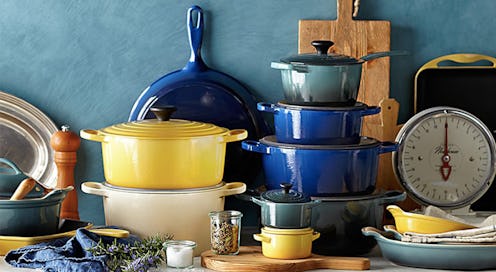(Living)
The Everyday Cooking Item You Already Have, But Aren't Using To Its Full Potential

Improving your skills in the kitchen has more benefits than you think. Sure, it's always nice to be able to tackle a new hobby and it's certainly an achievement to be able to host your friends and family without having to call in a massive Postmates order, but learning some culinary essentials — whether that means brushing up on basic techniques or knowing what everyday cooking pans to stock up on — also means taking control over the way you eat.
Having chic kitchen decor is a start — as is investing in a few chef-approved cookbooks — but the tools in your arsenal are also crucial to the kind of home cook you become whether you're looking to test some vegan recipes for dinner tonight or you're plotting a full-on sit-down feast with friends. And if you're still not well-versed enough to know the difference between a frying pan and a stock pot or you're confused about the benefits of non-stick versus stainless-steel pans, then who better to consult than the pros?
Dave Woodall, chef and co-owner at refined comfort food eatery Red Herring in Los Angeles has certainly honed his skills in the kitchen over the years, so he's learned firsthand which pots and pans are essential, even for those just starting out on their culinary adventures. "The most important thing with cookware is usability and nothing that gets used in your kitchen should be precious," Woodall explains. "With that in mind, there is a not-so-fine line between 'good cookware' and 'more than you’ll ever need.'"
The culinary guru has found that there are a few things to look out for when shopping for your new pots and pans. "I strongly recommend stainless steel, cast iron, and carbon steel aka 'blue steel' aka the Derek Zoolander of cookware," he says. "Stainless steel will stand up to the constant scouring that most home cooks are used to and carbon steel or cast iron, when cared for properly, provide a nonstick surface that won’t affect your meal."
And while some essential pans can be found at more affordable price points, Woodall warns that if you're trying to step up your cooking game, you should be prepared to shell out some cash. "A good set of pans will be expensive," he adds. So what exactly does he recommend for the essentials you'll use in your daily life? Ahead, find five pots and pans the chef suggests scooping up now, plus a few tips on how to use them and keep them around for the long haul.
Cast Iron Skillet
Meat eaters, this is one to have in your arsenal. "She’s your meat hero," Woodall explains. "Anytime you need to sear, make sure you’ve got cast iron near." But cooking novices should take note: Cast iron pans can require a little bit of specific maintenance. In addition to having to "season" your pan (a process of using butter or oil to create a non-stick finish), there are certain ground rules for care and cleaning. "Never soap cast iron, dishwasher or otherwise," he adds. "I recommend heating the pan on a dry burner until it’s smoking, then pour salt into the pan and scour with the towel using tongs to remove any residue."
Sauteuse
Unlike a skillet, sauteuse or sauté pans have higher sides, which made them ideal for cooking sauces, but also they're not as deep as some other pots. "Strong fences make good neighbors," Woodall says. "The sauteuse has enough depth and straight sides to cook almost anything without the high sides of a stock pot to clutter your field."
Stock Pot Or Dutch Oven
Both stock pots and dutch ovens are great for cooking stocks, soups, and anything braised. The main difference between these two deep-set pots are the material: stainless steel or cast iron. "Anytime you need to boil liquids, make stock, cook pasta, or blanch vegetables this is your best friend," Woodall explains. "Spend money on this item and it will last you the rest of your life."
Stainless Steel Skillet
This crucial piece of culinary equipment is, as Woodall explains, "a frying pan for all of your quick fire needs."
Non-Stick Egg Pan
"I very rarely recommend nonstick pans because they are designed to not be washed," explains Woodall. "Think of what happens when you scour a non-stick pan: It gets destroyed and then you’ve got something you’re counting on to be non-stick that doesn’t work correctly. Or worse yet, flakes the Teflon coating off into your food."
That said, there's one time a non-stick pan might actually be worthwhile. "You do need an egg pan," he concedes. "This should be the only piece of non-stick in your cabinet and it should only be used for eggs." For a non-toxic option, GreenPan makes super-affordable versions you can find a ton of major retailers.